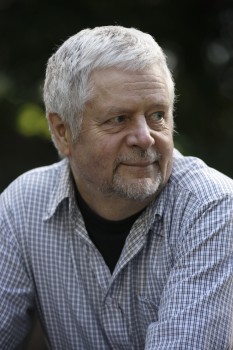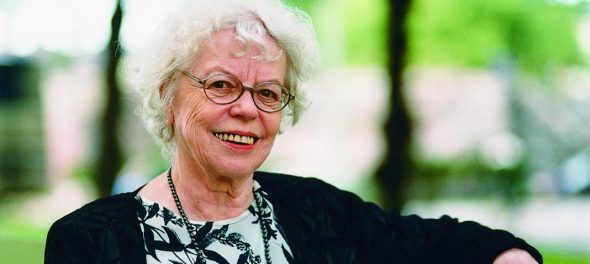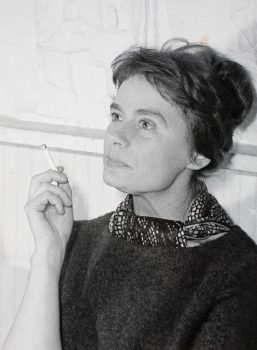Archives online
In the starry heavens
Issue 1/1987 | Archives online, Fiction, Prose
An extract from Tähtien tarhoissa (‘In the starry heavens’, 1912). Introduction by Matti Apunen
The sun sank and the evening began to draw in. It was a Wednesday towards the end of October, 2140. At Teuvo’s house the electric lights were being switched on.
Teuvo lived in Helsinki on what had once been Korkeavuori Street. Now it had no particular name. It was just Street No 311, for during the course of time there had been so many new streets that it had become impossible to name them all and numbering became necessary.
Teuvo’s home was on the thirtieth storey. But of course it was not important how high up you lived, because no one used stairs. Lifts had replaced the old flights of stairs, and even they were only seldom necessary.
Every storey had an airship stop, and since everyone, even the smallest children, had a pair of wings made of fine aluminium, it was very easy to go from one floor to another without using stairs.
Teuvo looked out of the window. There was a wide space between houses. On the right hand side of the road traffic was flying towards the centre of town, on the left in the opposite direction. What a lot of people there were! He could hear the even whisper of their wings. All kinds of people, old and young, were flying along. More…
Aphorisms
Issue 4/1986 | Archives online, Fiction, Prose
Aphorisms from Pahojen henkien historia (‘A history of evil spirits’, 1986). Markku Envall’s essay on aphorism
Do not set out in the wrong mood, at the wrong moment, for the wrong place.
Learn to distinguish these from one another, for it is an impossible task.
Do not admit to changes in yourself, say rather that your associates vary.
And that your relationships are changeable. But do not say this of yourself.
Not knowing a person should not be regarded as sufficient reason for not making his acquaintance. More…
Poems
Issue 4/1986 | Archives online, Fiction, poetry
Introduction by Kai Laitinen
Evening Mood
It’s widening:
an evening like a sigh –
languidly spreading across the land.
The tree’s unclothing
its branches of their colours, darkening.
As if something somewhere
were ringing and ringing –
a song straying like an orphan.
The words seem
something I’ve heard:
‘only a shadow –
only a shadow of a dream’
It’s slipping away. It’s dwindling.
Everything – everything – I’ve been given
I’ll give away. More…
Jacob’s Dream
Issue 3/1986 | Archives online, Fiction, Prose
An extract from Hänen olivat linnut (‘Hers were the birds’, 1967). Introduction by Pirkko Alhoniemi
‘It was Jacob’s Dream, Alma.’
How could she put it so Alma wouldn’t get hurt. Alma had ruined the surface of the painting. The pastor’s widow stood nervously in front of the window and tried to say what she’d had on her mind for several days but couldn’t quite come out with. When Alma went out of the house, the pastor’s widow would wander through the rooms and check on things. And the painting wasn’t the only object in danger, but also the birds. Their feathers were ruffled because Alma kept wiping them with a wet rag. How could she put it.
‘Alma.’
Alma turned to look at her.
‘It’s called Jacob’s Dream.’ More…
The Vatican
Issue 3/1986 | Archives online, Fiction, Prose
A short story from Maan ja veden välillä (‘Between land and water’, 1955). Introduction by Pirkko Alhoniemi
At the top of the hill there was a cow barn with all kinds of trash scattered along its walls: rusty pails, pottery shards, old shoes, all the stuff country people toss onto rubbish heaps. The clucking of chickens and bleating of sheep filled the air. As I was running across the barnyard I had an idea that a chicken had probably just laid an egg on the grass or was looking for some place to lay an egg, because it was letting out such sharp scolding cries.
Many of us were running across the yard and in back of the cow barn. If I hadn’t been on my way to the Vatican I would have stayed to pat a calf that was rubbing its side against a wall of the cow barn in the glow of the rising sun. But I was in a hurry. I didn’t dare let the women out of my sight because I couldn’t find the way by myself, I couldn’t even remember exactly where I had joined the crowd. I had just seen them running by and while I hadn’t intended to start off for the Vatican just that day, I went along with them anyway. More…
Three prose poems
Issue 3/1986 | Archives online, Fiction, poetry, Prose
Prose poems from Runot ja proosarunot (‘Poems and prose poems’,1966) and Maan ja veden välillä (‘Between land and water’, 1955 ). Introduction by Pirkko Alhoniemi
Underground
I went underground, I was looking for my brother’s grave, and I saw him lying under a transparent slab of marble. His face was like gold, death had passed from it, and I knew I no longer mourned him. I came above ground. At the edge of the graveyard there was a round tower made of stone and I was high up in the top of the tower. There stood my brother in dark trousers, white shirt, looking exactly the same, in the same position as in the dim photograph someone, I don’t remember who, took of him when he was about to go fishing, hands in his pockets, head held high, he was looking up at something, not at me. And I asked him: ‘Did it hurt when the bullet went through your head, when the exploding bullet went through your head in the battle of Karhumäki, and you were still alive at the first aid station and you said something they told us about in a letter.’ He answered, ‘Yes, it did hurt.’ ‘What’s your life like now, tell me.’ I said. He raised a hand and pointed to the sky. The sky was blue, and white clouds were scudding across it. More…
Power or weakness?
Issue 3/1986 | Archives online, Drama, Fiction
An extract from the play Hypnoosi (‘Hypnosis’, 1986). Introduction by Soila Lehtonen
As you all know, this company has been my life’s work and it stands for everything I’ve had to renounce. You know that for years I have not received a penny for my personal expenses, that I am on the firm’s lowest wage level, zero.
I haven’t even had a free cup of coffee; if, because I have been working hard or I wanted to improve my concentration, I have felt like a cup of coffee, I have always gone to the canteen during my coffee break and challenged one of the boys to a bout of arm wrestling under the agreement that the loser buys the coffees, and the bloke has paid. The money never came out of the firm’s running expenses, investments, trusts or funds. More…
The life of a lonely friend
Issue 3/1986 | Archives online, Fiction, Prose
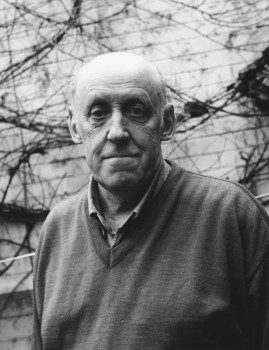
Bo Carpelan. Photo: Charlotta Boucht
Extracts from Bo Carpelan‘s novel Axel, ‘a fictional memoir’ (1986). In his preface to the novel Bo explains how he ‘found’ Axel.
Preface
In the 1930s I came across the name of Axel Carpelan (1858-1919), my paternal grandfather’s brother, in Karl Ekman’s Jean Sibelius and His Work (1935). In the bibliography, the author briefly mentions quotes from letters in the book addressed to Axel Carpelan, ‘who belonged to the Master’s most intimate circle of friends, and in musical matters was his constant confidant. Sibelius commemorated their friendship by dedicating his second symphony to him’. I had never heard Axel’s name mentioned in my own family.
Many years after Karl Ekman, the original incentive for the novel about Axel arose through Erik Tawaststjerna’s biography of Sibelius, in which Axel is portrayed in the second volume (1967) of the Finnish edition, and whose life came to an end in Part IV (1978). From early 1970s onwards, I started notes for Axel’s fictional diary from to 1919. It is not known whether Axel himself ever kept a diary. I relied as muchas possible on all the available facts. These increased when I was given access to letters exchanged between Axel and Janne from the year 1900 onwards. It became the story of the hidden strength a very lonely and sick man, and of a friendship in which the give and take both sides was far greater than Axel himself could ever have imagined.
Hagalund, June 1st, 1985
Bo Carpelan
![]()
1878, Axel’s diary
15.1.
On my twentieth birthday, I remember the young Wolfgang; ‘Little Wolfgang has no time to write because he has nothing to do. He wanders up and down the room like a dog troubled by flies’. However, that dog achieved a paradise. I have learnt yet one more piece of wisdom: ‘It is my habit to treat people as I find them; that is the most rewarding in the long run’. More…
Human Freedom
Issue 2/1986 | Archives online, Fiction, Prose
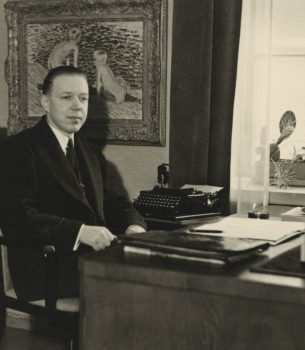
Mika Waltari. Photo: SKS Archives
Extract from lhmisen vapaus (‘Human Freedom’, 1950)
‘Where are we?’ Yvonne asked. ‘This isn’t the right street either. Somewhere between Alma and Georges V, they said. But there’s no sign of an aquarium.’
‘Talking of aquariums’, I suggested, ‘there’s a dog shop near here where they wash dogs in the back room. If you like, I’ll take you to see how they wash a dog. It’s a very soothing experience.’
‘You’re crazy’, said Yvonne.
My feelings were hurt. ‘I may sleep badly’, I admitted, ‘but I love you. I walk up and down the embankments all night. My heart aches, my brain is on fire. Then comes blissful intoxication, and for a little while I can be happy. And all you can do is to keep nagging, Gertrude.’
She wrinkled her brow, but I went on impatiently, ‘Look, Rose dear, just at present I have the whole world throbbing in my temples and in my finger-tips. Age-old poems are bubbling up within me. I am grieving for lost youth. I am boggling at the future. For just this one moment it is given to me to see life with the living eyes of a real human being. Why won’t you let me be happy?’
‘I have walked two hundred kilometres’, said a low, timid voice at my elbow. I stopped. Yvonne had stuck her arm through mine. She, too, stopped. We both looked down and saw a little man. He doffed a ragged cap and bowed. Flushed scars glowed through a grey stubble of beard. He was wearing a much-patched battle-dress from which the badges had long since disappeared. His face was wrinkled, but the little eyes were animated and sorrowful. More…

